A Simple Story

Yisroel Besser shares the backstory of the Reb Dovid Feinstein book
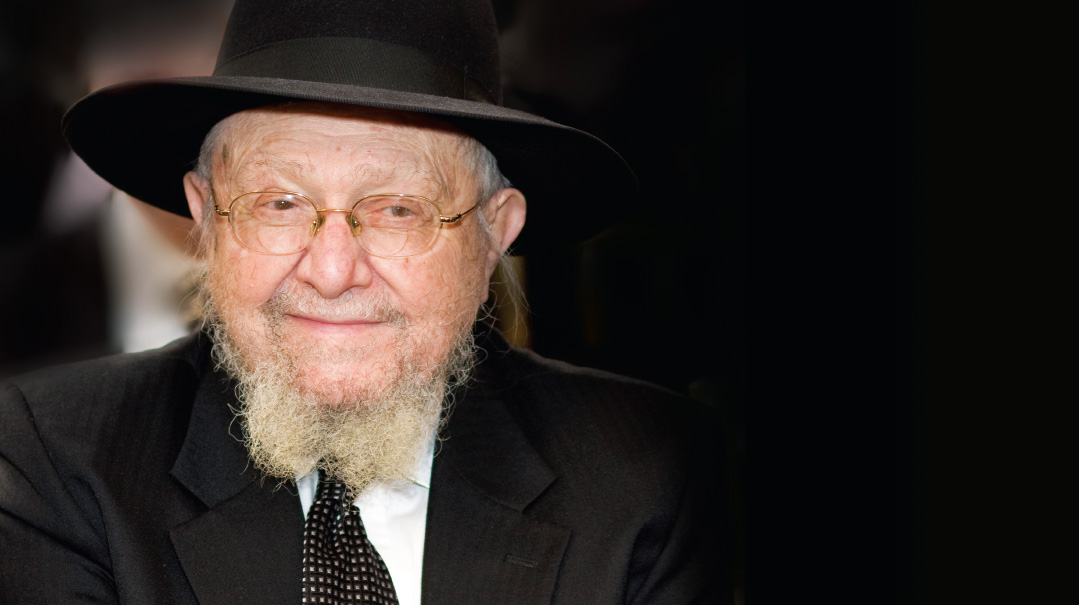
Photos: Mattis Goldberg, AEGedolim, ArtScroll/Mesorah
When I was asked to write a biography of Rav Dovid Feinstein ztz”l, I thought I knew how the process would unfold.
It’s not the first time I was charged with the biography of a gadol, and not the second, but it might as well have been — because in the past, most of the subjects were more defined. There was a story to tell, and all it needed was someone to retell it. Pretty simple stuff, really; a bit of interviewing, gathering, and assembling.
Reb Dovid, however, had no definition, and no defined role. In what was likely the shortest hesped in the history of the American Torah world, at his levayah on the 19th of Cheshvan, 2020, his friend Rav Shmuel Kamenetsky said that Reb Dovid was an “oisnam fuhn a mentsch. What that means is he was very special, kulo tov… he was a min bifnei atzmo, an entirely unique being; there was no one like him.”
If anyone else would have said that, you’d have assumed he was struggling to find the right words for some vague concept he doesn’t quite have a handle on. But Reb Shmuel chooses his words well and knows what he wants to convey.
Proof of this is that nearly a year after the levayah, I went to interview the Philadelphia Rosh Yeshivah and hear his personal impressions of Reb Dovid, and he said, “At the levayah, I already said, he was a ‘min bifnei atzmo.’ ”
Reb Shmuel meant exactly what he had said.
Reb Dovid was a rosh yeshivah and a posek with a worldwide following. He was a good, good friend to his talmidim, a devoted neighbor to the locals — and to his extended family, he was the loving uncle who shows up on time to simchahs and sits there enjoying the sight of generations united.
And he was also an East Sider and also a Feinstein.
Somehow, even as this family’s interpretations of halachah provided the basis for many of the customs and mores of America’s postwar Torah community, they maintained over the past half-century their privacy, their peaceful silence, their mystique.
It was the mystique that made this book so unique.
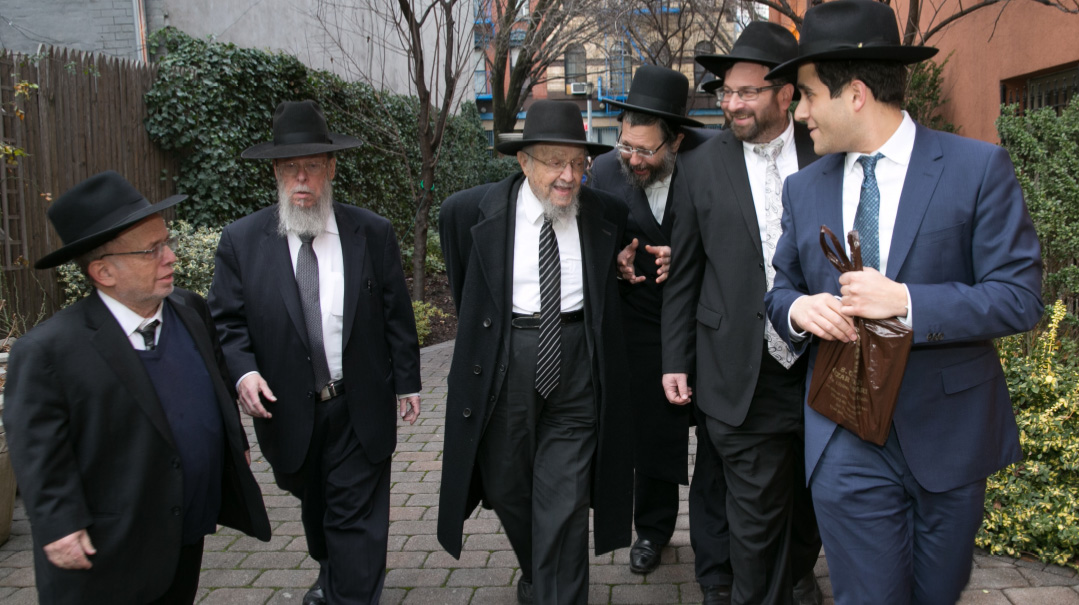
It came down to the glimpses. Rav Dovid entering the Lower East Side’s Chasam Sofer shul with a group of talmidim
TO be honest, the Feinsteins’ utter privacy and unpretentiousness also made the process of writing this book very challenging.
Generally, the writing process for a gadol biography follows a predictable path. It starts with a list of interviewees — usually the obvious ones, the closest talmidim and gabbaim — and that list grows branches and tributaries as each one shares his perspective, then passes the writer off to a close friend whom “you must speak with.”
(Over the years, I have discovered that it is not necessarily the closest talmidim who have the best stories, and very often, the opposite is true. The quiet one in the corner, the one who just passed through, might hold on to a single cherished encounter even after he has moved on, while the close ones no longer see the extraordinary in what has become a routine encounter.)
This project, however, came with no lists. Rav Dovid Feinstein learned, then taught Torah in the very same institution, Mesifta Tiferes Jerusalem, for over 80 years, yet there was no formal database of talmidim for me to speak to. His web of relationships was written on a record in his own mind, known only to him. And he maintained those relationships with all sorts of people.
There were the accomplished poskim and rabbanim who could not sign off on a ruling or hashkafah decision without his approval. The businessmen, partners in his myriad secret tzedakos, who relied on his blessings and advice; the doctors — whose advice he sought, appreciated, but also sometimes rejected, knowing precisely what was within their purview and what was not; and the blue-collar friends and neighbors whose company he cherished.
The best way to reach him was on the yeshivah pay phone in the hallway, and the callers ranged from children unsure about what brachah to make on a granola bar to Rav Yosef Shalom Elyashiv. There were the locals, members of the daily minyan he personally assembled every day of the year, and the steady stream of scholars from Brooklyn and Lakewood who came in search of his pure Torah.
Most of his people had only this in common — Reb Dovid — and would likely be hard-pressed to make conversation if seated around the same table without him there. How could they refer me to one another if they didn’t even know each other?
Aside from the challenge in tracking down his people, there was another element to this assignment that made it challenging: Because all those interviewees are his people, they have developed his mannerisms and style.
It comes with an ability to use as few words as possible to convey a point; much like Reb Dovid, they have no use for drama or overstatement.
Reb Dovid would shrug and say, “This is what it is,” or “Okay,” to convey a point, and that was the extent of his response. The matter at hand could be a halachic teshuvah with million-dollar ramifications, a brachah to a desperate petitioner, or a response to a neighbor who thought it looked like rain.
Rebbetzin Malke Feinstein was kind and encouraging throughout my research and writing, but her role as Reb Dovid’s spouse for 70 years was to protect him and allow him privacy. In a comment that tells far more of her greatness than she realizes, this humble woman told me, “Reb Dovid didn’t tell me very much. He would hang up the phone, and I would say, ‘What was that about?’ and he would say, ‘Nothing.’ I knew it wasn’t nothing, because my husband didn’t talk about nothing, but it meant he couldn’t share it.”
And that was it. She didn’t ask again, understanding and appreciating the nature of his — and her — exalted calling.
I had the zechus to sit with the current rosh yeshivah, Rav Berel Feinstein, for a lengthy interview — perhaps a total of five minutes. He was polite and courteous, but even from his privileged perspective, had no dramatic or colorful stories for me. Whatever he saw growing up was perceived as every day, ordinary life. In the shadow of his Zaidy — the man we reverentially refer to as Reb Moshe — halachah and middos fused to create a very simple reality.
I asked the Rosh Yeshivah if his father ever gave him mussar. He thought for a moment and shrugged. “Mussar? Not really, but sometimes, when we were kids, me and my younger brother Mordy would fight around. So when I turned bar mitzvah, my father called me over and said, ‘Berel, you’re a gadol now, you can’t be mazik another person anymore.’ That was it.”
These stories are their own sort of poetry, but not what we’re used to.
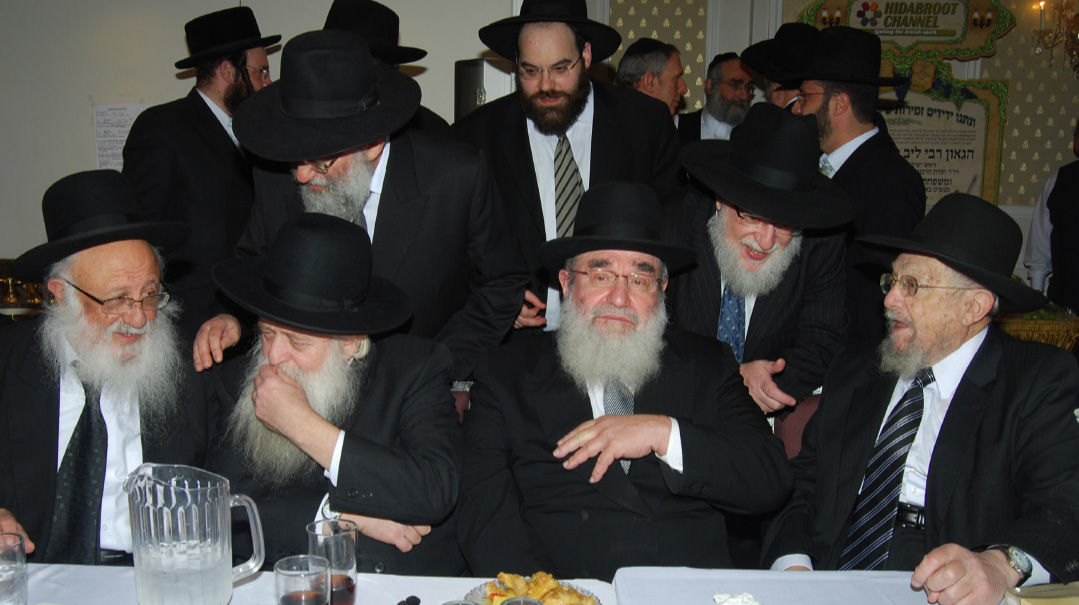
Heirs to a legacy of Torah grandeur cloaked in utter simplicity. With his brother Rav Reuven
The Lower East Side, Rav Dovid’s neighborhood, is the land of simple joys, so there is no room for exaggeration and no use for exaggeration. No one is in competition with anyone else.
Here, a crisp autumn day with a clear blue sky is something to appreciate. Everyone lives in apartments, so privacy is not just a value but a way of life: There are no fancy cars in driveways and no landscaped lawns. People emerge from their buildings and go off to jobs as lawyers, as kashrus mashgichim, as teachers and hedge fund managers, but you’ll never know who does which.
Bourbon and a bit of herring and marble cake after the post-Shacharis Mishnayos shiur on a random Wednesday morning, when such a repast might be unexpected, bring joy to the back table at MTJ. The neighborhood people smile at a good joke, and those who learn Torah at MTJ do it with that same casual simplicity that marks all the residents of the Lower East Side. There is no plaque celebrating the one who came first or left last, who took the bechinah on the most blatt, or who wowed the oilam with his chaburah — because those ambitions wouldn’t even be understood here in MTJ, where all is pure and simple.
Shacharis, breakfast, sit down to learn… and then learning, until forever. There was no formal bein hazmanim in MTJ, because, as they say in yeshivah, “mima nafshach” — either way, if someone is needed at home or has somewhere they have to be, then they should be there, and if not, where else would they be if not the beis medrash? Masechtos were learned in their entirety, and the Rosh Yeshivah said shiur every day, including taaneisim and Isru Chag.
This neighborhood, this yeshivah, molded Reb Dovid, its best-kept secret and also its pride. He dressed as they did, joined in their simchahs and events like any other good neighbor, prepared platters of lox and vegetables and laid out plates for the annual Melaveh Malkeh, and sold daled minim each year to benefit the yeshivah, and also answered the people’s hardest sh’eilos and was there for them at their hardest moments.
How do you write a book about such an untheatrical life?
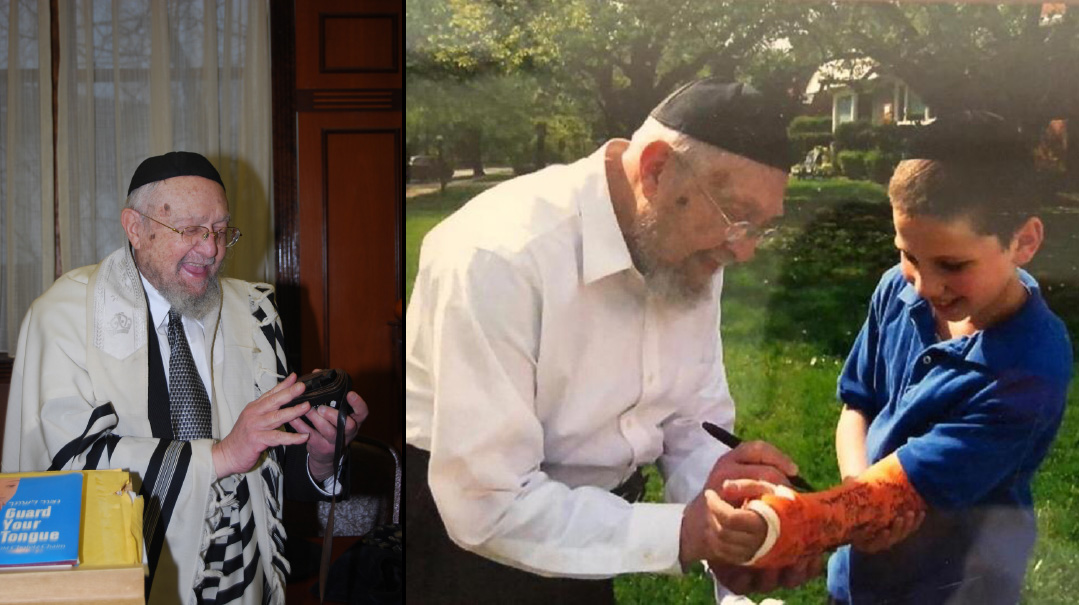
Much like his neighborhood, Rav Dovid was unpretentious and undemanding. The small pleasures of life were reasons for joy
IT came down to the glimpses. To trying to capture the perfect authenticity in the Rosh Yeshivah of MTJ walking home after Minchah in his plain black suit, a man who could easily have 50 phone calls to return after a first seder, who ruled on life-and-death questions and offered clarity on topics few others would touch, stopping at the playground on the corner on East Broadway to watch the kinderlach play, to hug and kiss the eineklach who hurried over to Zaidy.
To transcribing the unprepared, unrehearsed recollections of the local shoemaker, a hardworking Russian immigrant who had toiled to build up his shop only to see a competitor open a full-service dry cleaners/tailor/shoe-repair business a block away, threatening to swallow him up.
The man with the apron and thick mustache told me about the day he shared his distress with his client, the Rosh Yeshivah, who spoke in that reassuringly straightforward tone, showing no alarm and no indignation. “Parnassah is from the Ribbeinei shel Eilam, the other guy can’t touch you,” the Rosh Yeshivah said.
That was it. The happy ending followed, as they usually did after Reb Dovid’s assurances, but that is not the story. The story is the way he educated people to feel the tranquility of simple faith and to live that way as well.
There was a moment with the local barber, a young man burdened by a major personal problem. His friends persuaded him to take advantage of the fact that the greatest posek in America was his customer, and the next time Reb Dovid came in for a haircut, the young barber summoned up the courage to ask if they could speak privately.
Sure, said the Rosh Yeshivah, inviting him to come to yeshivah after Minchah the next day.
But by the next day, his courage had faded, and the barber did not come, and the day after that, he could not imagine how he had even imagined himself worthy of sharing personal issues with Reb Dovid.
On the third day, Reb Dovid came back just before closing time — not for a haircut. “You mentioned that you wanted to talk,” Reb Dovid said gently, “so come, let’s sit down and schmooze a bit.”
I stood on the wide sidewalks outside MTJ, looking up at bridge spans and snaking car traffic, surrounded by a medley of colors, signs, and languages on dry cleaners and liquor stores and pharmacies. Amid all the vibrancy of the present, I could almost touch a heavy cloud of memory.
The memories of a Yid who would walk, surrounded by a relatively small group of young men — he called them “the boys” — who hung on to his every word. As they walked, they would toss the questions at him, their rebbi, and with each step came another answer: “muttar” or “assur,” a practical eitzah no one had yet thought of, or a novel way of understanding a sugya based on perfect mastery of the sources.
Because the man of silence spoke words of Torah like few others, and that is his legacy: it is the core of this book, because he himself taught that all of it, the sweetness and ta’am and charm, were just the results. Torah was the mission.
“If a person closes the Gemara after learning, and he is no kinder than when he sat down to learn,” taught Reb Dovid, “then he should open the Gemara and learn again, because it is a sign that he did not learn correctly.”
That’s the story.
And while the good men and women of the Lower East Side may not have the drama and flair of natural raconteurs, when it came to this story — the life of their beloved rosh yeshivah — simply sitting and watching them was a story in itself.
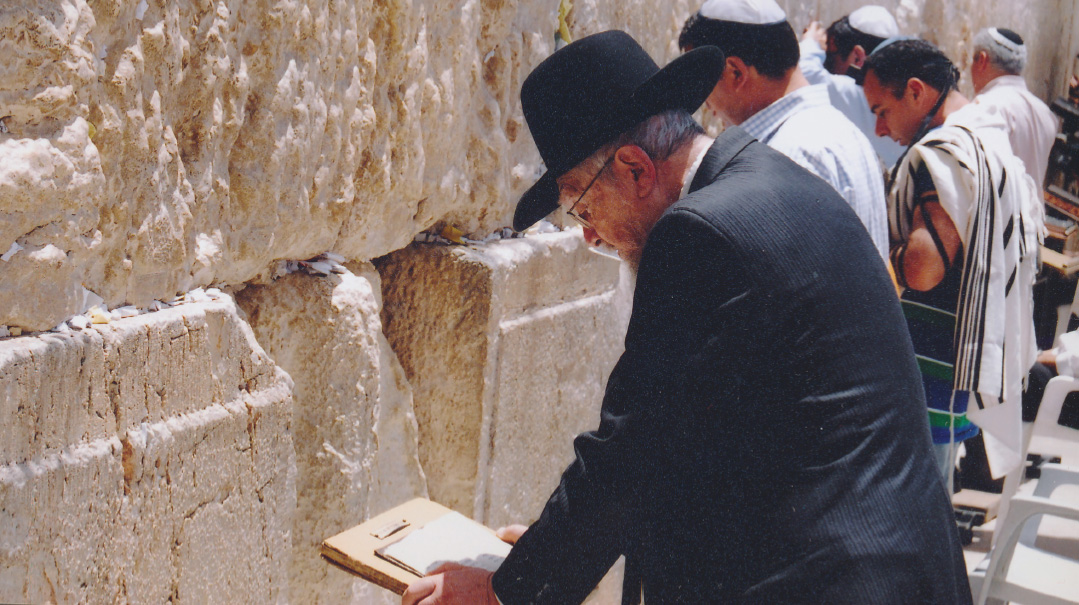
A pillar of tefillah at the place of tefillah
For masses of Jews, Rav Dovid Feinstein was the undisputed address when it came to halachic quandaries. With clarity, brevity, and compassion, he provided answers to the thorniest questions and most complex issues — and provided questioners with the assurance of a path forward.
An excerpt from the new ArtScroll biography “Reb Dovid” paints the picture with color, detail, and heart
A Partner with Heaven
In conversation with a talmid, Reb Dovid was once discussing his father’s reputation as a meikil, a halachic authority who takes a more lenient approach.
“My father was not a meikil,” Reb Dovid said, “but what he did was, he imagined that the agunah whose future was in question was his own daughter, and what lengths he would go to if that were the case.”
Rav Moshe himself was asked why he made himself available and accessible to questioners when so many of their questions were simple — easily answerable by local talmidei chachamim with more free time than Rav Moshe had.
Rav Moshe replied that he had come from a family of great talmidei chachamim, with brothers and brothers-in-law who were no less worthy than he, and yet he alone had survived the war. There was no reason that HaKadosh Baruch Hu should have spared him at a time of such punishment, he reflected, unless it was for this reason: since he had a mission to be there for the people, answering, guiding, and simply listening to whoever sought his advice.
Reb Dovid inherited this mandate, seeing it as his achrayus to answer anyone who had a question, at almost any time.
And he felt that the responsibility to pasken meant seeing not just the question, but the questioner as well.
A young mother was asked to sign a DNR for her young child, and after hearing the particular circumstances of this case, Reb Dovid gave a heter for her to do so. Even though she understood the reasons for doing so, she couldn’t bring herself to sign the paper.
Reb Dovid told her, “I don’t know if it is good for you to sign it, but it is good for the child if you do.”
Her family members marveled. With this single sentence, he conveyed to her that signing the paper was an act of love and dedication by a mother for her child, and not the opposite, giving her the peace of mind that she was doing right by her child — what a mother really wants most.
HEknew when to be compassionate and when to be forceful.
A certain rav heard reports of a serious flaw in the background of a particular family. That family, whom he assumed to have the halachic status of mamzeirim, had a son who was engaged to be married. This rav wanted to call the kallah’s family and update them with his findings.
He shared his discovery with Reb Dovid, telling him how he had obtained this information. Reb Dovid did not agree that the method of discovery was a form of eidus.
“If you call them, you are a rotzeiach, a murderer,” Reb Dovid said, his voice a bit stronger than usual, but his demeanor and calm the same as if he were paskening whether or not to say Tachanun at Minchah.
“The family is kosher,” he said, and the conversation was over.
A
talmid was getting new retzuos for his tefillin, and he asked Reb Dovid whether they should be painted black on both sides, or only on one side.
Reb Dovid said to paint them black on one side.
The talmid was surprised by the answer and asked for the reason.
“If it were better to have both sides of the retzuos painted black,” Reb Dovid said, “do you think the previous generations would not have been careful about that? Do you think they didn’t know how to do that? You should get black on one side only so that people should not look at you and think that it’s a hiddur mitzvah to paint both sides black and all those who do not are only yotzei bedieved.”
A mechaber seforim was working on a halachic treatment of the halachos of chuppah, and he brought it to Reb Dovid for review. Reb Dovid quickly scanned the list of chumras, stringencies, that were being recommended and looked up, his voice carrying a hint of disapproval. “Listen, my father got married kedas u’kedin, according to the precise details of halachah, and so did your father, so why are you saying these things?”
Someone close to him asked a sh’eilah, and Reb Dovid issued a psak.
The person started to argue, and Reb Dovid gently stopped him. “You are a very big baal kisharon,” he said, “but the Magen Avraham was a bigger baal kisharon, so we will go with him on this.”
One of Reb Dovid’s close talmidim had learned under several other great gaonim before he came to MTJ.
“I learned under Reb Dovid for the fewest years, but I learned the most Torah from him. I wondered how that could be,” this talmid reflects, “and then I realized that he was getting sh’eilos on kol haTorah kulah, the entirety of Shulchan Aruch and beyond, so just sitting and listening to his routine conversations was being exposed to all of that.”
He describes the scene. “Bochurim would call from their yeshivah pay phones to discuss new shavers, listing model numbers, and Reb Dovid was patient and as humble as a neighborhood rav in a small shul as he answered each one. The Rosh Yeshivah kept a lift-and-cut shaver in his drawer, and he would use it to show people how to dull the blades, when the situation called for it, in order to make the shaver permissible for use. He could be displaying the shaver to a visitor, while a child from the cheder popped in to ask what brachah to make on a wafer, and then a call came in with a question about a woman in labor, the doctors unsure whether to save the mother or the baby. Reb Dovid answered each with the same confidence and composure, moving seamlessly between parts of Torah, his voice and demeanor the same regardless of the complexity of the question.
“Then there were the sh’eilos that were uniquely his, the type that poskim elsewhere had said, ‘Only Reb Dovid could answer this,’ and those of us privileged to listen and hear those sh’eilos were exposed to yedios that we might never have known.”
The talmidim would look on in awe at the way the entirety of Torah seemed to be spread out before their rebbi.
A talmid was walking Reb Dovid to breakfast one morning, and said that he had a difficulty with a Gemara on Maseches Shabbos 147b — a masechta unconnected to anything being learned formally in yeshivah that zeman. Reb Dovid stopped walking and stood in place for about ten seconds, then nodded and said, “Okay.”
He was ready, the Gemara in front of him.
“There was another unique feature to the Rosh Yeshivah’s psak,” notes a prominent posek. “You didn’t need to follow up with him. His initial answer somehow covered all eventualities, in just a few words. It could be a medical sh’eilah asked on a Friday, and his teshuvah would incorporate the medical aspects, the Shabbos aspects, and the practical aspects. Sometimes, you didn’t think he heard the whole question, but his grasp was so quick that he heard exactly what you were saying, understood the implications, and addressed every part of it in his brief answer.”
HE respected doctors’ opinions, and often sought advice from a small network of doctors he trusted, but at the same time, a very strong sense of bitachon was part of the decision-making process.
A caller once shared the doctor’s prediction regarding a certain course of treatment and its devastating side effects. Reb Dovid listened, then said, “The side effects are just speculation. It will be fine, don’t worry about that part.”
It was obvious that Reb Dovid had a clear line in his mind between what was fact and what was not, his guidance a perfect interplay between bitachon and deep understanding of medical realities.
A respected rav was charged with administering a fund to help a widow in his community, and he had several questions.
“The questions were tricky, pitting what was good for her against what she wanted, and in the Rosh Yeshivah’s answer, there was this perfect blend of mastery of halachah and true compassion. I had researched this topic beforehand and was fluent in all the contemporary teshuvos on these halachos,” recalls the rav, “and I don’t know if Reb Dovid had read them all, but he certainly anticipated every single one of their svaros and took them into account.”
Rav Elimelech Bluth, a respected posek and prime talmid of Rav Moshe, once described his rebbi’s son as a steamroller. “He takes all the bumps in the road and smooths them out. Any Gemara, any sugya, any halachah is smooth and clear after he explains it.”
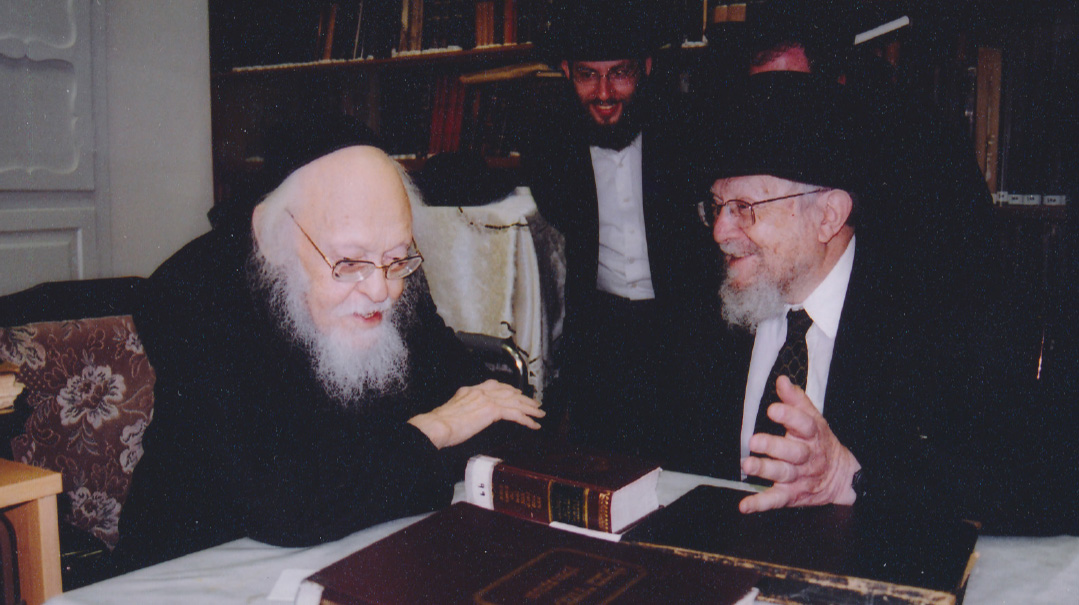
Rav Dovid subjugated his own opinion to that of Rav Elyashiv, and even donated his personal funds to help print Rav Elyashiv’s Torah
Reb Dovid’s talmidim were so used to seeing Divine approval to his rulings that they grew to expect it: They knew that following the Rosh Yeshivah’s advice would yield blessing.
A successful retailer was bought out by a large chain of stores, which paid him with a mix of cash and shares in the parent company. The problem was that the parent company was open on Shabbos.
He went to ask Reb Dovid how to proceed, and the Rosh Yeshivah told him that he had to sell those shares and relinquish his partnership in the company. Even though it seemed a poor decision business-wise, the man had no compunctions about following Reb Dovid’s instructions, and he sold his shares.
Within a year, the parent company faced unexpected struggles and filed for bankruptcy. This retailer was able to buy back his own store for much less money than he had received by selling those shares!
A close talmid owned a bank in a Central American country, and he came to ask Reb Dovid if it was necessary to write a heter iska. According to government records, he explained, there were just a few hundred Jews in a country of several million people, making them a tiny minority, far less than a percentage point of the general population.
Yes, Reb Dovid paskened, it was necessary to have a heter iska in place before the bank would lend money.
“As for the miut you mentioned,” he continued, “that isn’t the case. Because when it comes to commerce, Jews are always in the center of it. Look at Russia, which has close to 150 million people, and less than one percent are Jews, yet many of those on the list of the 100 richest people in Russia are Jewish!”
The talmid accepted the psak, and just a few weeks later, a client defaulted on a loan. His history showed that he was a businessman who had come to the country from Israel, where he had been born. A Jew. Like Reb Dovid said.
Near the end of Rav Moshe Feinstein’s life, an intricate sh’eilah was presented to him, and he answered. The questioner was worried that perhaps Rav Moshe, ill and weak, hadn’t fully grasped the sh’eilah. “If my father understood the question, then you should certainly listen to him,” Reb Dovid told them, “and even if he did not, he still has the siyata d’Shmaya to pasken correctly.”
Reb Dovid had siyata d’Shamaya as well. The Rosh Yeshivah’s words, talmidim felt, were accepted in Heaven, creating a reality.
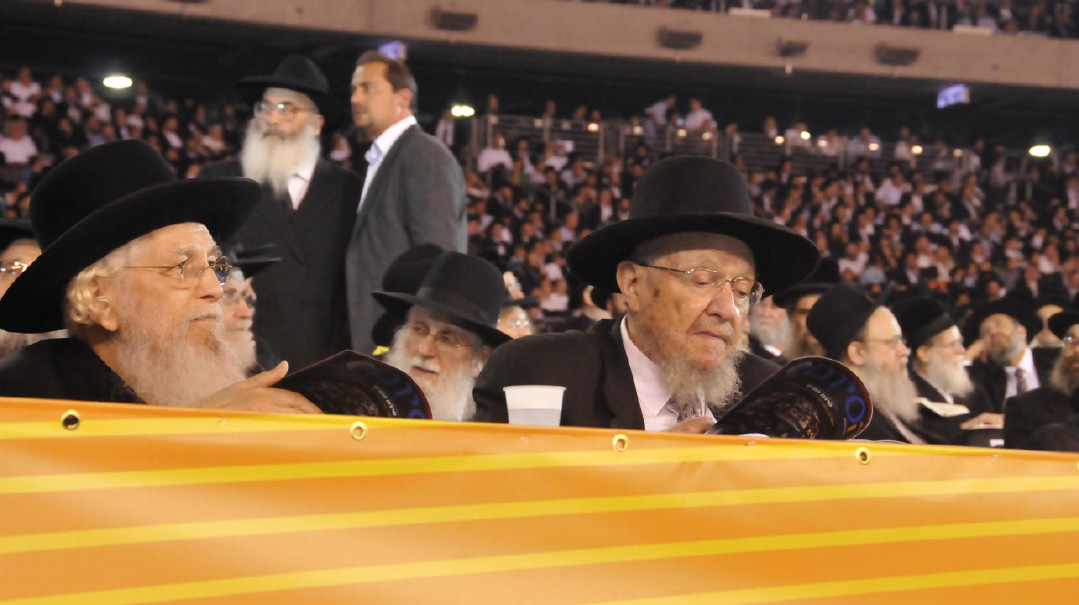
An interrupted saga. Rav Dovid Feinstein learned, then taught Torah in the very same institution, Mesifta Tiferes Jerusalem, for over 80 years.
When a yeshivah parts ways with a rebbi, there is an established custom for the institution to give severance pay in the form of “chodesh l’shanah,” one month’s salary for every year that the rebbi taught there.
Reb Dovid would tell talmidim in business to do the same with any employee with whom they were forced to part ways.
“We didn’t always know the basis for his psak, if it was halachah, hashkafah, proper middos, or something else,” says a talmid, “but it made no difference to us. You see, we hear about the ‘fifth cheilek of Shulchan Aruch,’ but when someone has so thoroughly mastered the first four chalakim, his fifth is even more potent!”
Reb Dovid saw every single word of Chazal as reality, and his answers often reflected that. It was a reality that Chodesh Adar is a time of mazel for a court case or business deal, because Chazal say so. It is fact that a person who recites Havdalah over a cup of wine will have sons.
A talmid in the yeshivah had the merit of attending to the Mashgiach, Rav Michel Barenbaum, and at times, he had to miss seder or shiur in order to drive the Mashgiach home. He asked Reb Dovid if he should find someone else to help the Mashgiach during times meant for learning.
Reb Dovid encouraged him to cherish the zechus he had been given, and keep being meshamesh the Mashgiach, quoting the words of Chazal that “gedolah shimushah, yoser milimudah — greater is the service of Torah than the learning of Torah.”
“I don’t know exactly what this means,” Reb Dovid said, “but if Chazal say that this is the reality, then it is the reality. Maybe it means there is special brachah in the learning you do if you are also meshamesh talmidei chachamim, but you certainly will not lose out.”
Someone came to honor him to serve as sandek at his son’s bris, and he made a joke referencing the words of the Maharil that being sandek is a segulah for wealth.
Reb Dovid told him a story. Several years earlier, the yeshivah secretary told the Rosh Yeshivah that a certain Mrs. Klein had called the yeshivah office several times, looking for him. Reb Dovid returned the call.
She asked if he was David Feinstein, the son of Rabbi Moshe Feinstein, and he said that he was.
Mrs. Klein explained her sad situation. Her only daughter had given birth to a boy, but she and her son-in-law were not religious and had no interest in arranging a bris milah for the child. Mrs. Klein herself was religious, and when she protested, they told her that if she wanted to take care of the bris, they wouldn’t object.
She would be making the bris in her home in Long Island, Mrs. Klein said, and she didn’t have anyone to honor as sandek. She’d heard about Rav Moshe Feinstein and learned that he had a son who had taken over the yeshivah. So she’d looked up the number in the phone book, and now she wanted to invite him to come serve as sandek at her grandson’s bris.
Reb Dovid accepted, and on the designated day, he traveled to Long Island.
There was a sparse crowd on hand, and he didn’t know any of the people there, but when Mrs. Klein asked him to stay for the seudah, he agreed. She asked him to share a few words, and again, he agreed. Then he wished the family well and returned to the Lower East Side.
Several years passed, and he received a phone call from a lawyer one day. Once Reb Dovid identified himself, the lawyer informed him that Mrs. Klein had passed away and had named him as a beneficiary in her will. She’d left $100,000 to David Feinstein.
Reb Dovid looked at his visitor and completed the story. “I did not accept the money for myself, giving it to the yeshivah, but the point is, if the Maharil says that sandekaus is a segulah for ashirus, then it means precisely that, whether we see it or not. It’s a reality.”
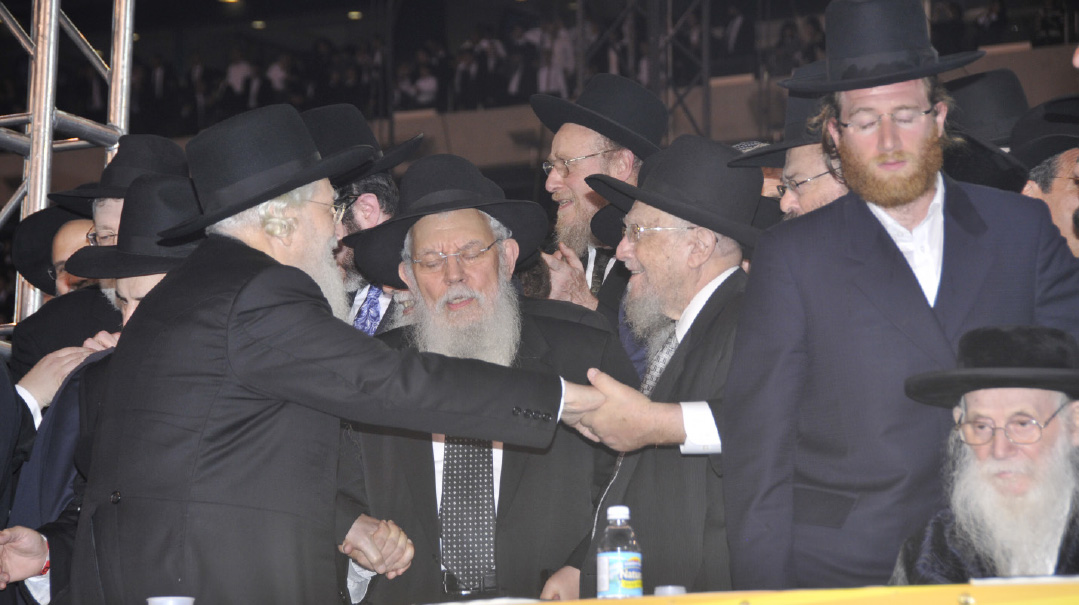
Celebrating at the Siyum Hashas
A bochur asked whether he had to heed his parents’ request to come home from yeshivah for Shabbos. His own learning and growth, he felt, would benefit more from his being in yeshivah, and the yeshivah he learned in discouraged leaving for Shabbos.
Reb Dovid replied by quoting an expression.
“What does it mean to ‘live the Torah’?” he asked.
“Living the Torah,” he explained, “does not only mean learning Torah. It means weighing the aspects of bringing joy to one’s parents against the gain of being in yeshivah. If the yeshivah lets you go home, then that is what you should do. If they do not — if they are very strict, then discuss it with your parents, and they will come to a compromise with you.”
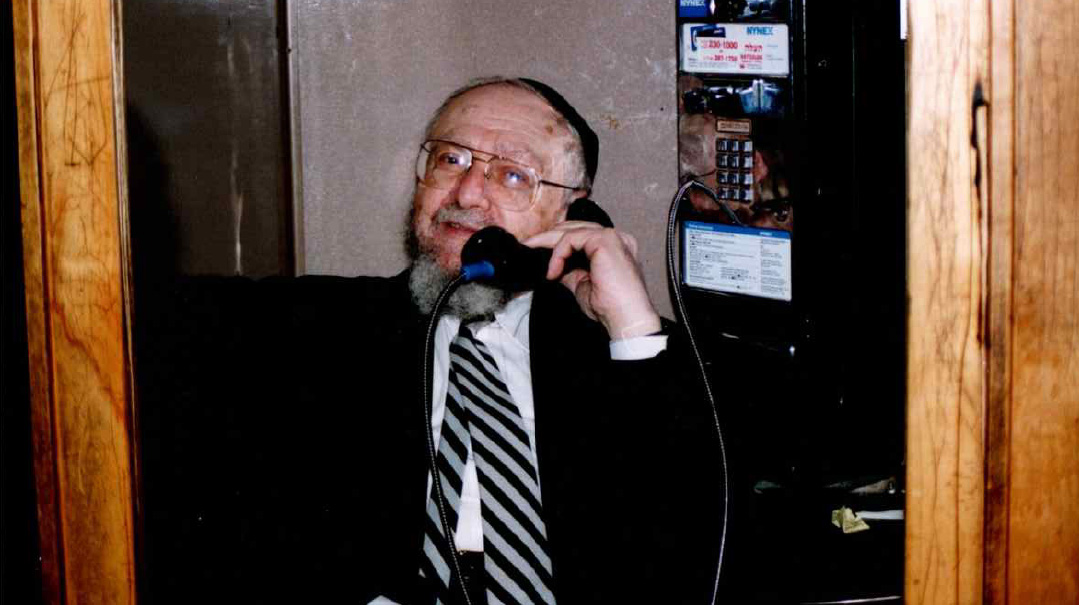
Rav Dovid speaking on the yeshivah payphone, the easiest way to reach him. Callers ranged from children unsure about what brachah to make on a granola bar to Rav Yosef Shalom Elyashiv
AS much as he knew and as fluently as he knew it, there was extraordinary humility in the way he paskened sh’eilos.
If a questioner would say, “Rav Shlomo Zalman is machmir, but… ” then Reb Dovid would not be meikil, even in cases when he personally ruled leniently. Instead, he would say, “Then you should follow what Rav Shlomo Zalman says,” unwilling to suggest a different option once that shitah had been quoted.
He completely nullified his own opinion to that of Rav Elyashiv. He had a designated seforim shelf for Rav Elyashiv’s teshuvos, and he would give personal funds to Rav Elyashiv’s grandson to help print his grandfather’s Torah.
A group of askanim asked him if a particular case they were involved with qualified as pidyon shevuyim or not. After thinking, he said, “I cannot find a single proof in Shas and the poskim to answer this. I recommend that you go ask Rav Elyashiv this question.”
One of the askanim spoke up. “With all due respect to Rav Elyashiv,” he said, “if the Rosh Yeshivah cannot find a re’ayah, is it likely that Rav Elyashiv will be able to?”
“No,” said Rav Dovid, “he probably will not find a re’ayah either. But when there are no re’ayos, no sources in Chazal to direct us, then the hachra’ah lema’aseh, the practical decision has to come from a gadol b’Torah, and he is a real gadol!”
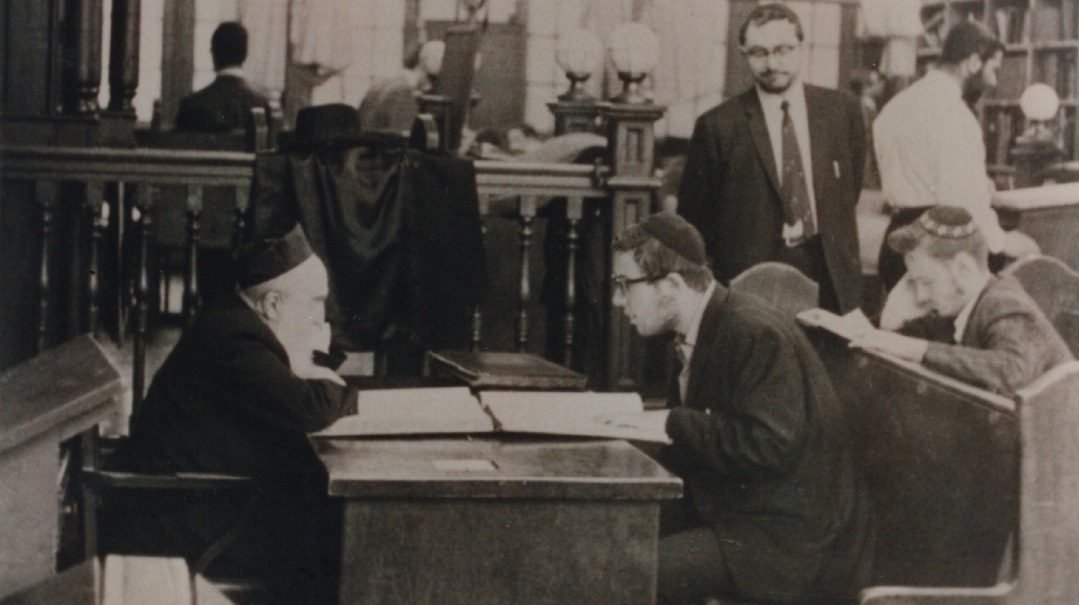
Rav Dovid looks on as his father learns with a chavrusah. Even as this family became the authoritative halachic address for America, they maintained their privacy and silence
When receiving brachos, young women would often ask him what to look for in a husband.
“That he be a talmid chacham is essential,” he would say, “but the most important thing is good middos and a love for Torah. Someone who has an appreciation for Torah can be motivated and inspired to learn more Torah, but with someone who does not have a feeling for it at all, it would be a challenge.”
In a particular kollel, the roshei kollel wanted the avreichim to immerse in the mikveh each day, feeling that the added purity would enhance the general level of learning.
A talmid who learned in that kollel went to discuss the custom with the Rosh Yeshivah. In the course of their conversation, this talmid mentioned that the seforim bring down that daily immersion is a segulah for zikaron, remembering what one learned.
Reb Dovid stopped walking as the talmid said that, and turned to face him. “I have another segulah for zikaron,” he said. “It is called chazarah [review].”
A young talmid chacham approached him with a sh’eilah, and Reb Dovid felt close enough to share some advice. “A ben Torah,” the Rosh Yeshivah said, “should not begin a question with ‘can I?’ but with ‘should I?’ Because the Ribbono shel Olam expects lifnim mishuras hadin [that one’s actions should be beyond the letter of the law].”
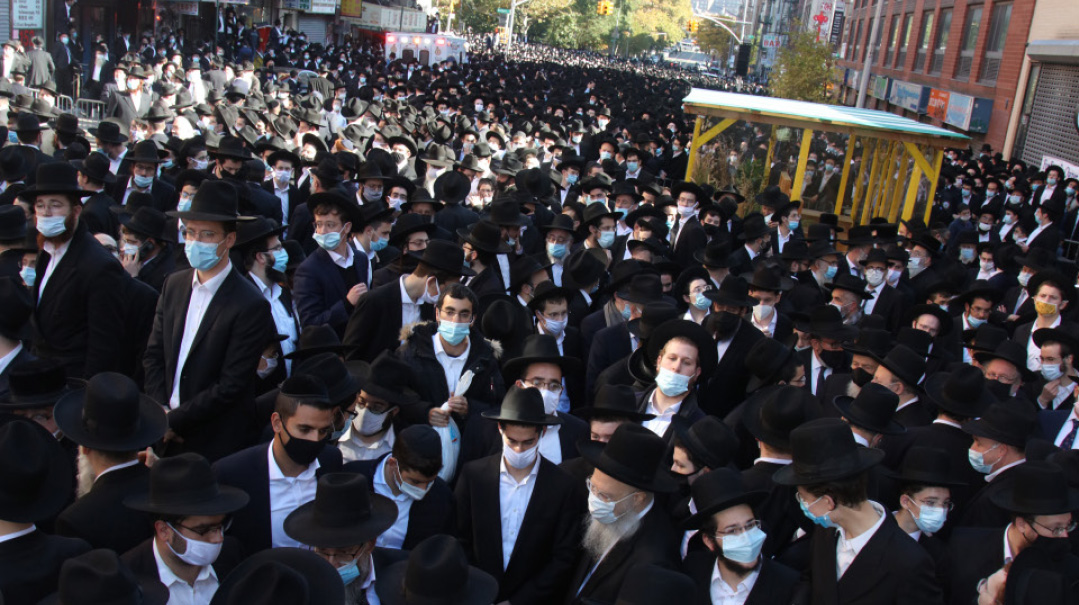
Talmidim knew better than to try to predict how the Rosh Yeshivah would answer a question, because often his advice was the exact opposite of what they expected.
A talmid who had no Internet access asked the Rosh Yeshivah whether or not it would be permitted to ask his friend, who did have Internet, to order something for him from an online store.
Reb Dovid replied that it depended on whether or not the friend had a filter on his computer.
The talmid nodded, certain that the Rosh Yeshivah meant to say that if there was a filter on that computer, he could ask, and if the computer was unfiltered, he had best not ask his friend to log on at all.
Then the Rosh Yeshivah explained what he meant.
“If he has a filter, you should not ask him to do you a favor, because a person who has a filter clearly aspires to kedushah and wants to be elevated. He likely has Internet access because it is necessary for his parnassah, or some such reason, but it is not fair to make him spend an extra moment online. But someone who has no filter has no such ambitions, so in that case, if he is online anyhow, let him at least do a favor for another Yid!”
The administrator of a school came with a group to ask the Rosh Yeshivah about what their financial obligations were to a rebbi who had suddenly taken ill and was no longer able to teach.
Reb Dovid looked around at them and spoke firmly. “You will take care of him, even if he never comes back, and you will continue to do so as long as he needs it.”
He didn’t explain or give sources, because he didn’t have to. They understood from the way he spoke that this was what the Torah itself wanted.
(Originally featured in Mishpacha, Issue 939)
Oops! We could not locate your form.

